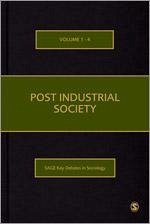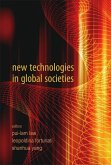Post Industrial Society
Herausgeber: Smart, Barry
Post Industrial Society
Herausgeber: Smart, Barry
- Broschiertes Buch
- Merkliste
- Auf die Merkliste
- Bewerten Bewerten
- Teilen
- Produkt teilen
- Produkterinnerung
- Produkterinnerung
The idea of 'post-industrial society' and a constellation of related terms, such as 'service society', 'knowledge society' and 'information society', achieved a prominent place in debates in sociology from the 1970s as analysts sought to make sense of the ways in which modern forms of life were being transformed. The central thesis, outlined in the influential works of American sociologist Daniel Bell, is that economic life, production and the world of work have been transformed by the introduction of innovations in information technology. In particular, in the second half of the 20th century…mehr
Andere Kunden interessierten sich auch für
![New Technologies in Global Societies New Technologies in Global Societies]() Pui-Lam Law / Leopoldina Fortunati / Shanhua Yang (eds.)New Technologies in Global Societies130,99 €
Pui-Lam Law / Leopoldina Fortunati / Shanhua Yang (eds.)New Technologies in Global Societies130,99 €![Online a Lot of the Time Online a Lot of the Time]() Ken HillisOnline a Lot of the Time116,99 €
Ken HillisOnline a Lot of the Time116,99 €![Globalization and the Digital Divide Globalization and the Digital Divide]() Globalization and the Digital Divide97,99 €
Globalization and the Digital Divide97,99 €![Portable Communities: The Social Dynamics of Online and Mobile Connectedness Portable Communities: The Social Dynamics of Online and Mobile Connectedness]() Mary ChaykoPortable Communities: The Social Dynamics of Online and Mobile Connectedness101,99 €
Mary ChaykoPortable Communities: The Social Dynamics of Online and Mobile Connectedness101,99 €![The Internet in the Middle East: Global Expectations and Local Imaginations in Kuwait The Internet in the Middle East: Global Expectations and Local Imaginations in Kuwait]() Deborah L. WheelerThe Internet in the Middle East: Global Expectations and Local Imaginations in Kuwait101,99 €
Deborah L. WheelerThe Internet in the Middle East: Global Expectations and Local Imaginations in Kuwait101,99 €![Web Social Science Web Social Science]() Robert AcklandWeb Social Science182,99 €
Robert AcklandWeb Social Science182,99 €![A Hoosier Village: A Sociological Study With Special Reference to Social Causation, Volume 46, issues 1-4 A Hoosier Village: A Sociological Study With Special Reference to Social Causation, Volume 46, issues 1-4]() Newell Leroy SimsA Hoosier Village: A Sociological Study With Special Reference to Social Causation, Volume 46, issues 1-431,99 €
Newell Leroy SimsA Hoosier Village: A Sociological Study With Special Reference to Social Causation, Volume 46, issues 1-431,99 €-
-
-
The idea of 'post-industrial society' and a constellation of related terms, such as 'service society', 'knowledge society' and 'information society', achieved a prominent place in debates in sociology from the 1970s as analysts sought to make sense of the ways in which modern forms of life were being transformed. The central thesis, outlined in the influential works of American sociologist Daniel Bell, is that economic life, production and the world of work have been transformed by the introduction of innovations in information technology. In particular, in the second half of the 20th century in the more highly developed societies, employment in manufacturing declined and professional, technical and other service occupations increased in number as developments in theoretical knowledge, information technology and communications became the initiators of change. This major new collection brings together contributions on post-industrial society and the 'techno-economic' realm from an impressive range of key thinkers including Marx, Penty, Riesman, Bell, Castells, Touraine, Dahrendorf, Giddens, Gorz and Lyotard. The 80 papers collected in the volumes: outline the emergence, development and historical roots of post-industrialism; critically engage with the thesis and related themes; explore economic and political dimensions, as well as the related notions of information and knowledge society; draw attention to the military-industrial roots of information technology; and in addition, give consideration to other 'post-industrial' matters involving architecture and design, urban spaces and increasingly important issues associated with surveillance and the environment.
Produktdetails
- Produktdetails
- Verlag: Sage Publications
- Four-Volume Set edition
- Seitenzahl: 1592
- Erscheinungstermin: 15. November 2010
- Englisch
- Abmessung: 111mm x 177mm x 244mm
- Gewicht: 3062g
- ISBN-13: 9781848601802
- ISBN-10: 1848601808
- Artikelnr.: 32812833
- Verlag: Sage Publications
- Four-Volume Set edition
- Seitenzahl: 1592
- Erscheinungstermin: 15. November 2010
- Englisch
- Abmessung: 111mm x 177mm x 244mm
- Gewicht: 3062g
- ISBN-13: 9781848601802
- ISBN-10: 1848601808
- Artikelnr.: 32812833
VOLUME 1 Introductory Essay: Post-Industrial Society and Information Technology - Barry Smart Section One: Post-industrialism: Genealogy Before Bell
The Chapter on Capital
And
The Chapter on Capital (Continuation)
- Karl Marx Extracts from Post-Industrialism - Arthur Penty Arthur Penty
s Post-industrial Utopia - David Lyon A Postindustrial Prelude to Postcolonialism: John Ruskin, William Morris, and Gandhism - Patrick Brantlinger Leisure and Work in Postindustrial Society - David Riesman Is There a Post-Industrial Revolution? - Norman Birnbaum Optimism of the Mind: Imagining postindustrial society in the 1960s and 1970s - Howard Brick Section Two: Post-industrial Society Thesis Notes on the Post-Industrial Society (I) - Daniel Bell Notes on the Post-Industrial Society (II) - Daniel Bell An Exchange On Post-Industrial Society - Daniel Bell and Christopher Lasch A Postmortem on Daniel Bell
s Postindustrialism - Laurence Veysey Mr. Veysey
s Strabismus - Daniel Bell The Axial Age of Technology Foreword 1999 - Daniel Bell Section Three: Alternative Views and Criticisms The Programmed Society and Its Sociology - Alain Touraine Toward A Theory of Post-Industrial Society - Christopher Lasch Three Authors in Search of a Proletariat - Thomas Bottomore Critique of Technocratic Theories - Anthony Giddens The Service Economy and Postindustrial Society: A sociological critique - Manuel Castells Daniel Bell
s Concept of Post-Industrial Society: Theory, myth and ideology - Victor Ferkiss The Post-Industrial Society? - Ralf Dahrendorf Post-Industrial Discourses - Andrew Feenberg Theory, Culture and Post-Industrial Society - Margaret Archer VOLUME 2 Section Four: Economic Issues The Second Industrial Revolution, 1870-1914 - Joel Mokyr The Third Industrial Revolution: Technology, productivity and income inequality - Jeremy Greenwood Economic Problems of A Post-Industrial Society - Robert L Heilbroner New Productive Forces and the Contradictions of Contemporary Capitalism: A Post-Industrial Perspective - Fred Block and Larry Hirschhorn The Post-Industrial Revolution - Andre Gorz Managing Professionals: Ideological Proletarianization and Post-Industrial Labor - Charles Derber The Nature and Design of Post-Industrial Organizations - George Huber Post-Industrial Development and the Obsolescence of Economic Categories - Fred Block Economic Culture in Post-Industrial Society: Orientation toward growth, work and technology - Ephraim Yuchtman-Yaar Post-Industrial Society and Economic Security - Jean-Baptiste de Foucauld That the Lumpen Should Rule: Vulgar capitalism in the post-industrial age - Paul G Buchanan Skill Saturation: Rationalization and post-industrial work - Aneesh Aneesh Professionals and the
Knowledge Economy
: Rethinking the theory of postindustrial society - Steven Brint From Pong to Planet Quake: Post-Industrial transitions from leisure to work - Hector Postigo The Political Economy of Post-Industrial Capitalism - George Liagouras Interview on Postindustrialism and the Future of the Welfare State - Gosta Esping-Andersen VOLUME 3 Section Five: Political issues Postindustrial Politics: How benign will it be? - Samuel P. Huntington Power, Politics, and Personality in "Post-Industrial Society" - Stanley Rothman and Robert S. Lichter The Perils of Postindustrialism - Richard Gillam Class Contradictions and Social Cleavages in Informationalizing Post-Industrial Societies: On the rise of new social movements - Timothy W. Luke Quest for Peace from Pre to Post-Industrial Society - S.R. Sen The 1994 Congressional Elections: The postindustrial realignment continues - Everett Carll Ladd
Post-Industrial Society
and the Psychology of the American Far Right, 1950-74 - Kendrick Oliver From
Post-Industrialism
to
Information Society
: A new social transformation - David Lyon Section Six: Information society and technology The Social Framework of the Information Society - Daniel Bell Daniel Bell
s Theory of the Information Society - Alistair Duff Materials for an Exploratory Theory of the Network Society - Manual Castells Deciphering Information Technologies: Modern societies as networks - Nico Stehr Empirical Study of the Information Society: Comparative analysis of employment in G7 countries, 1920 to 2000 - Yuko Aoyama and Manuel Castells The (Dis)information Society? - Jean-Claude Guedon The Telescoping Of Industrial and Post-Industrial Activities - Paul Virilio The Daydreams of Ipod Capitalism - Rob Wilkie Considerations on Miniaturization - Charles C Gordon VOLUME 4 Section Seven: Knowledge Society, Scholarship and the University The Menace of Liberal Scholarship - Noam Chomsky
The Field: Knowledge in Computerized Societies
and
The Problem: Legitimation
- Jean-Francois Lyotard
Performance
, The Future of the University and
Post-industrial
Society - Michael Peters The Concept of Knowledge Societies - Nico Stehr The Promise of a Knowledge Economy - Hetan Shah and Martin McIvor Section Eight: Military-(post)industrial Complex Military-Industrial Complex Speech - Dwight Eisenhower Technology and the Military - Barry Smart The Military-Academic Complex: Whös the real national champion? - Nicholas Turse The Runaway Military Budget: An analysis - Christopher Hellman The Militarization of US Higher Education after 9/11 - Henry Giroux The Information Army - Thomas K Adams Section Nine: Surveillance The New American School: Preparation for post-industrial discipline - Aaron Kupchik and Torin Monahan Technologies of Surveillance - Kiyoshi Abe A Report on the Surveillance Society - David Murakami Wood Dealing with Disorder: Social control in the post-industrial city - Katherine Beckett and Steve Herbert Section Ten: Environment Ecological Post-Industrialism - Barry Smart European Cities, the Informational Society, and the Global Economy - Manuel Castells Postindustrial Spaces - Scott Lash and John Urry
Line of Wreckage
: Towards a post-industrial environmental aesthetics - Jonathan Maskit New Urbanism as a Counter-Project to Post-Industrialism - Ellen Dunham-Jones The Post-Industrial Home - Gregory Demchak Section Eleven: Post-industrial Futures The World and the United States in 2013 - Daniel Bell The Fragility of the Future - Nico Stehr
The Chapter on Capital
And
The Chapter on Capital (Continuation)
- Karl Marx Extracts from Post-Industrialism - Arthur Penty Arthur Penty
s Post-industrial Utopia - David Lyon A Postindustrial Prelude to Postcolonialism: John Ruskin, William Morris, and Gandhism - Patrick Brantlinger Leisure and Work in Postindustrial Society - David Riesman Is There a Post-Industrial Revolution? - Norman Birnbaum Optimism of the Mind: Imagining postindustrial society in the 1960s and 1970s - Howard Brick Section Two: Post-industrial Society Thesis Notes on the Post-Industrial Society (I) - Daniel Bell Notes on the Post-Industrial Society (II) - Daniel Bell An Exchange On Post-Industrial Society - Daniel Bell and Christopher Lasch A Postmortem on Daniel Bell
s Postindustrialism - Laurence Veysey Mr. Veysey
s Strabismus - Daniel Bell The Axial Age of Technology Foreword 1999 - Daniel Bell Section Three: Alternative Views and Criticisms The Programmed Society and Its Sociology - Alain Touraine Toward A Theory of Post-Industrial Society - Christopher Lasch Three Authors in Search of a Proletariat - Thomas Bottomore Critique of Technocratic Theories - Anthony Giddens The Service Economy and Postindustrial Society: A sociological critique - Manuel Castells Daniel Bell
s Concept of Post-Industrial Society: Theory, myth and ideology - Victor Ferkiss The Post-Industrial Society? - Ralf Dahrendorf Post-Industrial Discourses - Andrew Feenberg Theory, Culture and Post-Industrial Society - Margaret Archer VOLUME 2 Section Four: Economic Issues The Second Industrial Revolution, 1870-1914 - Joel Mokyr The Third Industrial Revolution: Technology, productivity and income inequality - Jeremy Greenwood Economic Problems of A Post-Industrial Society - Robert L Heilbroner New Productive Forces and the Contradictions of Contemporary Capitalism: A Post-Industrial Perspective - Fred Block and Larry Hirschhorn The Post-Industrial Revolution - Andre Gorz Managing Professionals: Ideological Proletarianization and Post-Industrial Labor - Charles Derber The Nature and Design of Post-Industrial Organizations - George Huber Post-Industrial Development and the Obsolescence of Economic Categories - Fred Block Economic Culture in Post-Industrial Society: Orientation toward growth, work and technology - Ephraim Yuchtman-Yaar Post-Industrial Society and Economic Security - Jean-Baptiste de Foucauld That the Lumpen Should Rule: Vulgar capitalism in the post-industrial age - Paul G Buchanan Skill Saturation: Rationalization and post-industrial work - Aneesh Aneesh Professionals and the
Knowledge Economy
: Rethinking the theory of postindustrial society - Steven Brint From Pong to Planet Quake: Post-Industrial transitions from leisure to work - Hector Postigo The Political Economy of Post-Industrial Capitalism - George Liagouras Interview on Postindustrialism and the Future of the Welfare State - Gosta Esping-Andersen VOLUME 3 Section Five: Political issues Postindustrial Politics: How benign will it be? - Samuel P. Huntington Power, Politics, and Personality in "Post-Industrial Society" - Stanley Rothman and Robert S. Lichter The Perils of Postindustrialism - Richard Gillam Class Contradictions and Social Cleavages in Informationalizing Post-Industrial Societies: On the rise of new social movements - Timothy W. Luke Quest for Peace from Pre to Post-Industrial Society - S.R. Sen The 1994 Congressional Elections: The postindustrial realignment continues - Everett Carll Ladd
Post-Industrial Society
and the Psychology of the American Far Right, 1950-74 - Kendrick Oliver From
Post-Industrialism
to
Information Society
: A new social transformation - David Lyon Section Six: Information society and technology The Social Framework of the Information Society - Daniel Bell Daniel Bell
s Theory of the Information Society - Alistair Duff Materials for an Exploratory Theory of the Network Society - Manual Castells Deciphering Information Technologies: Modern societies as networks - Nico Stehr Empirical Study of the Information Society: Comparative analysis of employment in G7 countries, 1920 to 2000 - Yuko Aoyama and Manuel Castells The (Dis)information Society? - Jean-Claude Guedon The Telescoping Of Industrial and Post-Industrial Activities - Paul Virilio The Daydreams of Ipod Capitalism - Rob Wilkie Considerations on Miniaturization - Charles C Gordon VOLUME 4 Section Seven: Knowledge Society, Scholarship and the University The Menace of Liberal Scholarship - Noam Chomsky
The Field: Knowledge in Computerized Societies
and
The Problem: Legitimation
- Jean-Francois Lyotard
Performance
, The Future of the University and
Post-industrial
Society - Michael Peters The Concept of Knowledge Societies - Nico Stehr The Promise of a Knowledge Economy - Hetan Shah and Martin McIvor Section Eight: Military-(post)industrial Complex Military-Industrial Complex Speech - Dwight Eisenhower Technology and the Military - Barry Smart The Military-Academic Complex: Whös the real national champion? - Nicholas Turse The Runaway Military Budget: An analysis - Christopher Hellman The Militarization of US Higher Education after 9/11 - Henry Giroux The Information Army - Thomas K Adams Section Nine: Surveillance The New American School: Preparation for post-industrial discipline - Aaron Kupchik and Torin Monahan Technologies of Surveillance - Kiyoshi Abe A Report on the Surveillance Society - David Murakami Wood Dealing with Disorder: Social control in the post-industrial city - Katherine Beckett and Steve Herbert Section Ten: Environment Ecological Post-Industrialism - Barry Smart European Cities, the Informational Society, and the Global Economy - Manuel Castells Postindustrial Spaces - Scott Lash and John Urry
Line of Wreckage
: Towards a post-industrial environmental aesthetics - Jonathan Maskit New Urbanism as a Counter-Project to Post-Industrialism - Ellen Dunham-Jones The Post-Industrial Home - Gregory Demchak Section Eleven: Post-industrial Futures The World and the United States in 2013 - Daniel Bell The Fragility of the Future - Nico Stehr
VOLUME 1 Introductory Essay: Post-Industrial Society and Information Technology - Barry Smart Section One: Post-industrialism: Genealogy Before Bell
The Chapter on Capital
And
The Chapter on Capital (Continuation)
- Karl Marx Extracts from Post-Industrialism - Arthur Penty Arthur Penty
s Post-industrial Utopia - David Lyon A Postindustrial Prelude to Postcolonialism: John Ruskin, William Morris, and Gandhism - Patrick Brantlinger Leisure and Work in Postindustrial Society - David Riesman Is There a Post-Industrial Revolution? - Norman Birnbaum Optimism of the Mind: Imagining postindustrial society in the 1960s and 1970s - Howard Brick Section Two: Post-industrial Society Thesis Notes on the Post-Industrial Society (I) - Daniel Bell Notes on the Post-Industrial Society (II) - Daniel Bell An Exchange On Post-Industrial Society - Daniel Bell and Christopher Lasch A Postmortem on Daniel Bell
s Postindustrialism - Laurence Veysey Mr. Veysey
s Strabismus - Daniel Bell The Axial Age of Technology Foreword 1999 - Daniel Bell Section Three: Alternative Views and Criticisms The Programmed Society and Its Sociology - Alain Touraine Toward A Theory of Post-Industrial Society - Christopher Lasch Three Authors in Search of a Proletariat - Thomas Bottomore Critique of Technocratic Theories - Anthony Giddens The Service Economy and Postindustrial Society: A sociological critique - Manuel Castells Daniel Bell
s Concept of Post-Industrial Society: Theory, myth and ideology - Victor Ferkiss The Post-Industrial Society? - Ralf Dahrendorf Post-Industrial Discourses - Andrew Feenberg Theory, Culture and Post-Industrial Society - Margaret Archer VOLUME 2 Section Four: Economic Issues The Second Industrial Revolution, 1870-1914 - Joel Mokyr The Third Industrial Revolution: Technology, productivity and income inequality - Jeremy Greenwood Economic Problems of A Post-Industrial Society - Robert L Heilbroner New Productive Forces and the Contradictions of Contemporary Capitalism: A Post-Industrial Perspective - Fred Block and Larry Hirschhorn The Post-Industrial Revolution - Andre Gorz Managing Professionals: Ideological Proletarianization and Post-Industrial Labor - Charles Derber The Nature and Design of Post-Industrial Organizations - George Huber Post-Industrial Development and the Obsolescence of Economic Categories - Fred Block Economic Culture in Post-Industrial Society: Orientation toward growth, work and technology - Ephraim Yuchtman-Yaar Post-Industrial Society and Economic Security - Jean-Baptiste de Foucauld That the Lumpen Should Rule: Vulgar capitalism in the post-industrial age - Paul G Buchanan Skill Saturation: Rationalization and post-industrial work - Aneesh Aneesh Professionals and the
Knowledge Economy
: Rethinking the theory of postindustrial society - Steven Brint From Pong to Planet Quake: Post-Industrial transitions from leisure to work - Hector Postigo The Political Economy of Post-Industrial Capitalism - George Liagouras Interview on Postindustrialism and the Future of the Welfare State - Gosta Esping-Andersen VOLUME 3 Section Five: Political issues Postindustrial Politics: How benign will it be? - Samuel P. Huntington Power, Politics, and Personality in "Post-Industrial Society" - Stanley Rothman and Robert S. Lichter The Perils of Postindustrialism - Richard Gillam Class Contradictions and Social Cleavages in Informationalizing Post-Industrial Societies: On the rise of new social movements - Timothy W. Luke Quest for Peace from Pre to Post-Industrial Society - S.R. Sen The 1994 Congressional Elections: The postindustrial realignment continues - Everett Carll Ladd
Post-Industrial Society
and the Psychology of the American Far Right, 1950-74 - Kendrick Oliver From
Post-Industrialism
to
Information Society
: A new social transformation - David Lyon Section Six: Information society and technology The Social Framework of the Information Society - Daniel Bell Daniel Bell
s Theory of the Information Society - Alistair Duff Materials for an Exploratory Theory of the Network Society - Manual Castells Deciphering Information Technologies: Modern societies as networks - Nico Stehr Empirical Study of the Information Society: Comparative analysis of employment in G7 countries, 1920 to 2000 - Yuko Aoyama and Manuel Castells The (Dis)information Society? - Jean-Claude Guedon The Telescoping Of Industrial and Post-Industrial Activities - Paul Virilio The Daydreams of Ipod Capitalism - Rob Wilkie Considerations on Miniaturization - Charles C Gordon VOLUME 4 Section Seven: Knowledge Society, Scholarship and the University The Menace of Liberal Scholarship - Noam Chomsky
The Field: Knowledge in Computerized Societies
and
The Problem: Legitimation
- Jean-Francois Lyotard
Performance
, The Future of the University and
Post-industrial
Society - Michael Peters The Concept of Knowledge Societies - Nico Stehr The Promise of a Knowledge Economy - Hetan Shah and Martin McIvor Section Eight: Military-(post)industrial Complex Military-Industrial Complex Speech - Dwight Eisenhower Technology and the Military - Barry Smart The Military-Academic Complex: Whös the real national champion? - Nicholas Turse The Runaway Military Budget: An analysis - Christopher Hellman The Militarization of US Higher Education after 9/11 - Henry Giroux The Information Army - Thomas K Adams Section Nine: Surveillance The New American School: Preparation for post-industrial discipline - Aaron Kupchik and Torin Monahan Technologies of Surveillance - Kiyoshi Abe A Report on the Surveillance Society - David Murakami Wood Dealing with Disorder: Social control in the post-industrial city - Katherine Beckett and Steve Herbert Section Ten: Environment Ecological Post-Industrialism - Barry Smart European Cities, the Informational Society, and the Global Economy - Manuel Castells Postindustrial Spaces - Scott Lash and John Urry
Line of Wreckage
: Towards a post-industrial environmental aesthetics - Jonathan Maskit New Urbanism as a Counter-Project to Post-Industrialism - Ellen Dunham-Jones The Post-Industrial Home - Gregory Demchak Section Eleven: Post-industrial Futures The World and the United States in 2013 - Daniel Bell The Fragility of the Future - Nico Stehr
The Chapter on Capital
And
The Chapter on Capital (Continuation)
- Karl Marx Extracts from Post-Industrialism - Arthur Penty Arthur Penty
s Post-industrial Utopia - David Lyon A Postindustrial Prelude to Postcolonialism: John Ruskin, William Morris, and Gandhism - Patrick Brantlinger Leisure and Work in Postindustrial Society - David Riesman Is There a Post-Industrial Revolution? - Norman Birnbaum Optimism of the Mind: Imagining postindustrial society in the 1960s and 1970s - Howard Brick Section Two: Post-industrial Society Thesis Notes on the Post-Industrial Society (I) - Daniel Bell Notes on the Post-Industrial Society (II) - Daniel Bell An Exchange On Post-Industrial Society - Daniel Bell and Christopher Lasch A Postmortem on Daniel Bell
s Postindustrialism - Laurence Veysey Mr. Veysey
s Strabismus - Daniel Bell The Axial Age of Technology Foreword 1999 - Daniel Bell Section Three: Alternative Views and Criticisms The Programmed Society and Its Sociology - Alain Touraine Toward A Theory of Post-Industrial Society - Christopher Lasch Three Authors in Search of a Proletariat - Thomas Bottomore Critique of Technocratic Theories - Anthony Giddens The Service Economy and Postindustrial Society: A sociological critique - Manuel Castells Daniel Bell
s Concept of Post-Industrial Society: Theory, myth and ideology - Victor Ferkiss The Post-Industrial Society? - Ralf Dahrendorf Post-Industrial Discourses - Andrew Feenberg Theory, Culture and Post-Industrial Society - Margaret Archer VOLUME 2 Section Four: Economic Issues The Second Industrial Revolution, 1870-1914 - Joel Mokyr The Third Industrial Revolution: Technology, productivity and income inequality - Jeremy Greenwood Economic Problems of A Post-Industrial Society - Robert L Heilbroner New Productive Forces and the Contradictions of Contemporary Capitalism: A Post-Industrial Perspective - Fred Block and Larry Hirschhorn The Post-Industrial Revolution - Andre Gorz Managing Professionals: Ideological Proletarianization and Post-Industrial Labor - Charles Derber The Nature and Design of Post-Industrial Organizations - George Huber Post-Industrial Development and the Obsolescence of Economic Categories - Fred Block Economic Culture in Post-Industrial Society: Orientation toward growth, work and technology - Ephraim Yuchtman-Yaar Post-Industrial Society and Economic Security - Jean-Baptiste de Foucauld That the Lumpen Should Rule: Vulgar capitalism in the post-industrial age - Paul G Buchanan Skill Saturation: Rationalization and post-industrial work - Aneesh Aneesh Professionals and the
Knowledge Economy
: Rethinking the theory of postindustrial society - Steven Brint From Pong to Planet Quake: Post-Industrial transitions from leisure to work - Hector Postigo The Political Economy of Post-Industrial Capitalism - George Liagouras Interview on Postindustrialism and the Future of the Welfare State - Gosta Esping-Andersen VOLUME 3 Section Five: Political issues Postindustrial Politics: How benign will it be? - Samuel P. Huntington Power, Politics, and Personality in "Post-Industrial Society" - Stanley Rothman and Robert S. Lichter The Perils of Postindustrialism - Richard Gillam Class Contradictions and Social Cleavages in Informationalizing Post-Industrial Societies: On the rise of new social movements - Timothy W. Luke Quest for Peace from Pre to Post-Industrial Society - S.R. Sen The 1994 Congressional Elections: The postindustrial realignment continues - Everett Carll Ladd
Post-Industrial Society
and the Psychology of the American Far Right, 1950-74 - Kendrick Oliver From
Post-Industrialism
to
Information Society
: A new social transformation - David Lyon Section Six: Information society and technology The Social Framework of the Information Society - Daniel Bell Daniel Bell
s Theory of the Information Society - Alistair Duff Materials for an Exploratory Theory of the Network Society - Manual Castells Deciphering Information Technologies: Modern societies as networks - Nico Stehr Empirical Study of the Information Society: Comparative analysis of employment in G7 countries, 1920 to 2000 - Yuko Aoyama and Manuel Castells The (Dis)information Society? - Jean-Claude Guedon The Telescoping Of Industrial and Post-Industrial Activities - Paul Virilio The Daydreams of Ipod Capitalism - Rob Wilkie Considerations on Miniaturization - Charles C Gordon VOLUME 4 Section Seven: Knowledge Society, Scholarship and the University The Menace of Liberal Scholarship - Noam Chomsky
The Field: Knowledge in Computerized Societies
and
The Problem: Legitimation
- Jean-Francois Lyotard
Performance
, The Future of the University and
Post-industrial
Society - Michael Peters The Concept of Knowledge Societies - Nico Stehr The Promise of a Knowledge Economy - Hetan Shah and Martin McIvor Section Eight: Military-(post)industrial Complex Military-Industrial Complex Speech - Dwight Eisenhower Technology and the Military - Barry Smart The Military-Academic Complex: Whös the real national champion? - Nicholas Turse The Runaway Military Budget: An analysis - Christopher Hellman The Militarization of US Higher Education after 9/11 - Henry Giroux The Information Army - Thomas K Adams Section Nine: Surveillance The New American School: Preparation for post-industrial discipline - Aaron Kupchik and Torin Monahan Technologies of Surveillance - Kiyoshi Abe A Report on the Surveillance Society - David Murakami Wood Dealing with Disorder: Social control in the post-industrial city - Katherine Beckett and Steve Herbert Section Ten: Environment Ecological Post-Industrialism - Barry Smart European Cities, the Informational Society, and the Global Economy - Manuel Castells Postindustrial Spaces - Scott Lash and John Urry
Line of Wreckage
: Towards a post-industrial environmental aesthetics - Jonathan Maskit New Urbanism as a Counter-Project to Post-Industrialism - Ellen Dunham-Jones The Post-Industrial Home - Gregory Demchak Section Eleven: Post-industrial Futures The World and the United States in 2013 - Daniel Bell The Fragility of the Future - Nico Stehr








